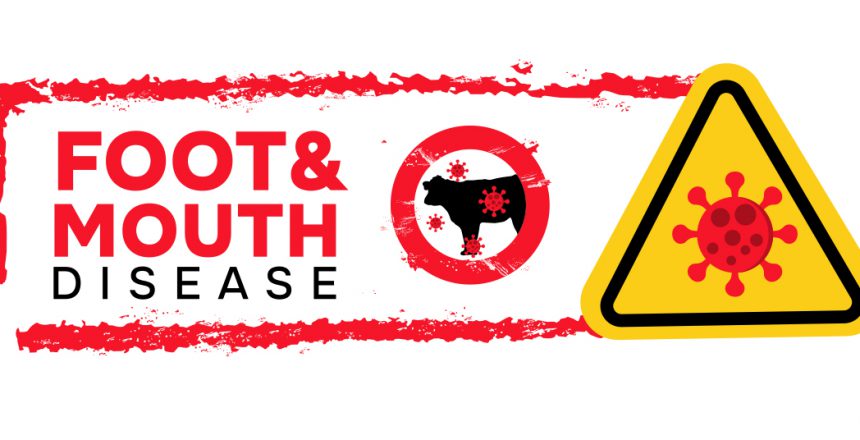WESTERN CAPE INVESTIGATES SUSPECTED FOOT-AND-MOUTH DISEASE LINKED TO CATTLE MOVEMENT
On 1 November 2025, a farmer in the Free State reported suspected foot-and-mouth disease (FMD) lesions in cattle recently transported from the Gouda area in the Western Cape.
In response, Western Cape Veterinary Services placed the property in Gouda under quarantine. During inspection, veterinarians observed suspected lesions in the animals’ mouths. Samples have been collected and sent for laboratory testing to confirm or rule out FMD.
Two additional properties, located in the Velddrif and Bredasdorp areas, from which cattle had been moved on 30 October 2025, have also been placed under quarantine and will be inspected.
The origin of the potentially infected cattle is still being verified. The transport company responsible for moving the animals is under investigation, and all properties linked to this company over the past 30 days will be contacted and inspected.
Foot-and-mouth disease is a controlled animal disease in South Africa. Any suspicion of the disease must be reported immediately to a state veterinarian. FMD is highly contagious and spreads through direct contact between infected animals, as well as via contaminated vehicles, equipment, feed and clothing. It affects cloven-hoofed animals such as cattle, sheep, goats, and pigs, causing painful sores in the mouth and on the feet. FMD does not affect humans.
To prevent the spread of foot-and-mouth-disease, farm biosecurity measures must be implemented and maintained, all cloven-hoofed animals must be transported with a health declaration and a declaration that they will be kept in isolation at the destination for 28 days.
All movements of livestock into and within the Western Cape must be reported via the online form at https://tinyurl.com/AnimalMovementApp. This enables Western Cape Veterinary Services to track and monitor high-risk movements.
Information packs have been developed for animal and landowners, auctioneers, and livestock transporters to ensure that they are aware of their responsibilities and applicable regulations. These can be accessed at https://www.elsenburg.com/western-cape/infopaks/
Further information on foot-and-mouth disease, including contact details for Western Cape Veterinary Services offices, is available at: https://www.elsenburg.com/western-cape/frequently-asked-questions/faq-foot-and-mouth-disease/
Media Enquiries
Mary James
Head of Communication
Cell: 084 817 2376
Email: Mary.James@westerncape.gov.za
WES-KAAP ONDERSOEK VERMOEDELIKE BEK- EN KLOUSEER-GEVAL WAT VERBAND HOU MET BEWEGING VAN BEESTE
Op 1 November 2025 het ’n boer in die Vrystaat letsels wat vermoedelik bek- en klouseer (BKS) is in beeste gerapporteer wat onlangs uit die Gouda-gebied in die Wes-Kaap vervoer is.
In reaksie hierop het die Wes-Kaapse Veeartsenydienste die betrokke plaas in Gouda onder kwarantyn geplaas. Tydens inspeksie het veeartse vermoedelike letsels in die diere se bekke waargeneem. Monsters is geneem en vir laboratoriumtoetse gestuur om die teenwoordigheid van BKS te bevestig of uit te sluit.
Twee bykomende eiendomme, geleë in die Velddrif- en Bredasdorp-gebiede, waarvandaan beeste op 30 Oktober 2025 verskuif is, is ook onder kwarantyn geplaas en sal geïnspekteer word.
Die oorsprong van die moontlik besmette beeste word nog geverifieer. Die vervoermaatskappy wat verantwoordelik was vir die vervoer van die diere, word ondersoek, en alle eiendomme wat die afgelope 30 dae met hierdie maatskappy kontak gehad het, sal gekontak en geïnspekteer word.
Bek- en klouseer is ’n beheerde dieresiekte in Suid-Afrika. Enige vermoedelike gevalle van die siekte moet onmiddellik by ’n staatsveearts aangemeld word. BKS is hoogs aansteeklik en word versprei deur direkte kontak tussen besmette diere, asook deur besoedelde voertuie, toerusting, voer en klere. Dit affekteer gesplete-hoefdiere soos beeste, skape, bokke en varke, en veroorsaak pynlike sere in die mond en op die pote. BKS raak nie mense nie.
Om die verspreiding van bek- en klouseer te voorkom, moet biosekuriteitsmaatreëls op plase ingestel en gehandhaaf word. Alle gesplete-hoefdiere moet vervoer word met ’n gesondheidsertifikaat en ’n verklaring dat hulle vir 28 dae in isolasie gehou sal word by die bestemming.
Alle beweging van vee na en binne die Wes-Kaap moet gerapporteer word deur middel van die aanlynvorm by https://tinyurl.com/AnimalMovementApp. Dit stel die Wes-Kaapse Veeartsenydienste in staat om hoërisiko-bewegings op te spoor en te monitor.
Inligtingspakkette is ontwikkel vir diere- en grondeienaars, afslaers en veevervoerders om te verseker dat hulle bewus is van hul verantwoordelikhede en die toepaslike regulasies. Hierdie pakkette is beskikbaar by: https://www.elsenburg.com/western-cape/infopaks/
Verdere inligting oor bek- en klouseer, insluitend kontakbesonderhede vir die Wes-Kaapse Veeartsenydienste se kantore, is beskikbaar by: https://www.elsenburg.com/western-cape/frequently-asked-questions/faq-foot-and-mouth-disease/
Medianavrae:
Mary James
Hoof van Kommunikasie
Selfoon: 084 817 2376
E-pos: Mary.James@westerncape.gov.za


